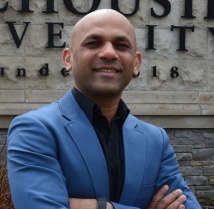Dr. Shashi Gujar, DVM, PhD, MHA
Assistant Professor

Email: shashi.gujar@dal.ca
Phone: 902-494-1973
Mailing Address:
Sir Charles Tupper Medical Building
Dalhousie University
Halifax, Nova Scotia, Canada B3H 1X5
- Cancer immunotherapies
- Oncolytic viruses
- Applied immunomics
- Immuno-metabolism
- Myeloma genomics
Head, Laboratory for Cancer Metabolism, Cell Biology & Immunotherapies
www.gujarlab.com
Interested in Joining Us?
WE ARE LOOKING FOR QUALIFIED GRADUATE STUDENTS AND POST-DOCTORAL FELLOWS. If you are interested in joining our research group, please send the following information to shashi.gujar@dal.ca: 1. Your complete CV, 2. Research statement stating how your training matches our research goals and why you would like to join our team.
Research & Clinical Interests
Our research program focuses on molecular and immunological aspects of human health, with special focus on personalized and precision cancer immunotherapies. Our multi-disciplinary interests include Oncolytic viruses, Immunology and immunotherapies, Epitope discovery, Cellular biology and metabolism, Applied immunomics and Proteo-immuno-metabolomics.
Translational immuno-metabolomics and oncolytic virus-based cancer immunotherapies
Similar to what you would read in sci-fi novels, viruses can be used to treat human malignancies. On October 27, 2015, the US Food and Drug Administration (FDA) approved the use of modified herpes virus (trade name Imlygic) for the treatment of skin cancer [similar approval was granted by the regulatory bodies in Europe as well]. This first-of-a-kind historic decision opened the doors for these modern anticancer medicines to be used in clinics.
These cancer-killing viruses, known as oncolytic viruses, act through two distinct mechanisms: 1) kill cancer cells directly, and 2) educate patient's immune system to attack cancer on its own. It is now clear that such education of the immune system against cancer is the indispensable part of this innovative therapy.
My laboratory specialises in harnessing the immunological benefits of oncolytic viruses. Our own research thus far has revealed that we can train the host immune system using these viruses- to not only eradicate the existing cancer cells, but also establish long-term protection against possible relapse. Thus, oncolytic viruses hold the key to promote lifelong cancer free health.
To achieve this goal, we have developed cutting-edge technology platforms that leverage the latest developments in the areas of immunology, metabolism and multiOMICs. Using these innovative approaches, we are set to discover the next generation of cancer immunotherapies which will aid the prevention, diagnosis and treatment of cancers.
